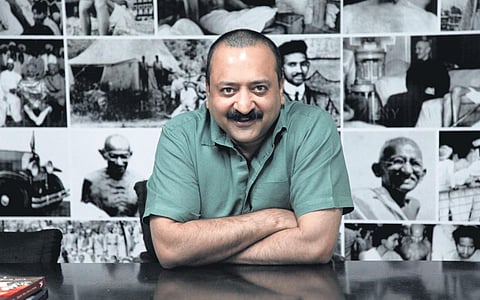

HYDERABAD: Birad Yajnik, the curator of Mahatma Gandhi Digital Museums in Hyderabad, Delhi, Johannesburg and Pietermaritzburg, had once held a lecture in front of a packed room of 2,500 people in Belgrade, Serbia. When people asked him why he chose to speak in Belgrade, a place that Gandhiji never visited, Birad replied, “Belgrade has seen years of wars and ravages. But, it bounced back and rebuilt everything. I don’t see a reason why Gandhiji shouldn’t be living here, he is definitely living here in spirit.”
Over the last decade, Birad and his team have covered five continents, 15 countries and 29 cities, with over 100 events and engagements that are aimed to enlighten more people about the Mahatma. Birad says Gandhiji was a global citizen and it only makes sense to tell more people about the freedom fighter’s life. Therefore, he is planning a similar engagement in Kazakhstan. “Nawab Mir Nasir Ali Khan, the Honorary Consul of the Republic of Kazakhstan for Telangana and Andhra Pradesh, and I have been in contact for a while now. While casually talking one day, he asked me why I didn’t do something in Kazakhstan. And I said, why not!” says Birad.
The details of the event planned in Kazakhstan are not decided yet, but Birad is confident that they will create a space for Gandhiji in the country. The author is in the process of translating his book MKG – Photo Biography of Mahatma Gandhi, published in 2010, into Kazakh. Apart from that, he has also planned several interactive programmes for the youth of Kazakhstan.
Birad aims to help people, especially the younger generation, to realise that they can be like Gandhiji. His photo biography of the leader does n0t have page numbers, but age numbers, indicating the point in life the freedom fighter was in. Through the digital museums and the various events that Birad and his team organises, they try to illustrate Gandhiji’s life with modern technology.
Bapu’s life is full of anecdotal inspiration, right from his childhood, to his time in South Africa as a young man, and his eventual Satyagraha movement that helped India attain freedom from the British Raj. There are close to 98 volumes of Gandhi’s writings that were curated by the Government of India. “Every time you read Gandhi’s writings, there’s a great scope for introspection. It will be enough if you can read a page every week, because it will give you enough time to introspect. You will definitely find something new every time you read about his life. One lifetime isn’t enough to understand Gandhiji,” says Birad.
When someone asks Birad why he does so much for Gandhiji, and if he is related to him, Birad replies, “Yes, I am related to him and even you are related to him. The secret is that I know it and you don’t. All eight billion of us are related to him.”Persistence, integrity and compassion — these are the values by which Birad remembers the father of the nation. Everything from his diet, to his experiments with truth, Gandhi’s life is a mine of wisdom.
The Mahatma Gandhi Digital Museum in Hyderabad, the first of its kind, has been shut for the last 18 months due to the pandemic. Birad is planning to reopen it soon. His team is planning to make it into a central repository for all the other museums and the work they have done all around the world. “We have so much data, so we want to put it in one place. Somebody wants to know about his diet, his school records, or his time in South Africa. Hence, we want to make the Hyderabad museum as the one central repository,” says Birad.